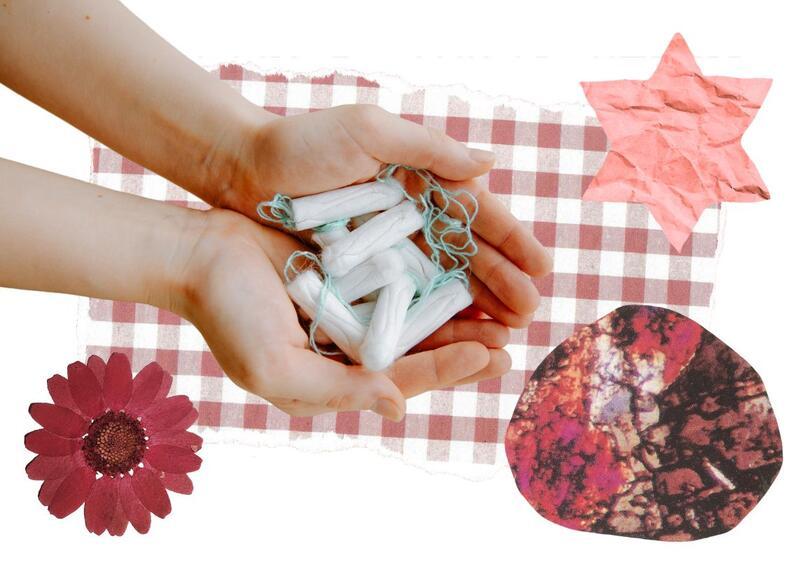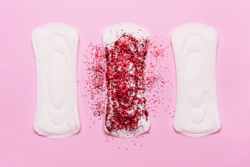Anita Diamant’s and My Advocacy for Menstrual Equity
As someone who suffers from ruthless cramps the week before and the week of my menstrual cycle, focusing on and completing daily tasks never takes priority over my need to lay in bed with a heating pad to soothe my aches. No matter how much I want to be participating in class, I have no choice but to place my routine call to my mom asking her to sign me out of school. My teachers, unlike my mom, don’t understand the need to escape school when I’m in pain, and oftentimes treat me as if my cramps are a form of playing hooky. If you can relate to my experience and have a story like this of your own, you have also experienced period stigma. In addition to stigma, many people who menstruate can also suffer from period poverty. Throughout history, individuals entering their menstrual cycle become targets of sexism by a largely uneducated society that has been made to believe that periods are “gross” or an “excuse for women to be moody.”
Anita Diamant, a Jewish-American author, works to relinquish women from this pungent feeling of shame through her informative essay collection Period. End of Sentence. This anthology touches on many important discussion points, but the core focus is: why do we need to destigmatize periods, and how can we prevent period poverty?
In an interview with Hadassah Magazine, Diamant notes, “We were raised to be squeamish, we were raised not to say anything about this, to whisper.” On a similar note, the opening lines of her book read, “For millions of people, ‘cursed’ is an accurate description of how it feels to live in a body that bleeds." As a Jewish woman, Diamant found it important to discuss the way Judaism and Jewish culture responds to a person's menstrual cycle, a large part of this being the rituals that take place at a mikveh. Diamant discusses how mikvehs play a role in a Jewish person's menstrual cycle in her book, but before the publication of this book, she helped found an inclusive and accessible mikveh for all forms of Jews, Mayyim Hayyim. In her most recent book, Diamant explained, “After menstruation, women are to immerse in water, specifically in a ritual bath called a mikveh before they can be sexually available to their husbands.” But Diamant, along with many other liberal and feminist Jews, reinterpreted this idea, through the work of inclusive mikveh practices at Mayyim Hayyim. Diamant made it evident that the mikveh at Mayimm Hayyim would “respect the choices and modesty of everyone who visits.”
Not just through religion, but also through social tropes, women have been made to believe that ovulating makes them impure or less worthy of sexual attention because of its effect on men. According to the National Library of Medicine, if you are menstruating in India, you are not supposed to enter the kitchen because some people believe you will cause the food to spoil. In Tanzania, some people believe that if you allow another person to see your used menstrual cloth, you’ll become cursed. All kinds of cultures and religions have offered commentary on how women should act when on their period and the way they treat menstruation, and, for many women, this means a loss of autonomy over their own bodies.
Diamant’s call to end period poverty inspired me to volunteer to work on this issue in my own community through an organization called J-SERVE: Jewish Teens Serving the World. I and five other young women decided to research period poverty. For the J-SERVE project, we were tasked with creating a day of service for the Houston community. We created a slideshow about the issue to present to the one hundred participants in attendance. We also did hands-on work, providing the local women's homeless shelter, Star of Hope, with menstrual items through a drive we put together. I didn't know it at the time, but this experience would be my call to action, and the importance of advocacy for period poverty would persist even afterwards. I started to take myself out of the equation, and really acknowledge the unjust circumstances. Periods are hard enough for me, dealing with cramps, leaking, and aches, but many women can't even afford basic necessities like Advil, tampons, and pads to lessen these symptoms. This is incredibly unfair. These problems affect a diverse group of people: women experiencing homelessness, students, transgender and nonbinary individuals, and those who are currently imprisoned, among others. And even though studies show there are more women than men in poverty, period products cannot be purchased with food stamps, Medicaid, or health insurance spending accounts, exacerbating the problem.
Furthermore, many period necessities are still taxed by the government, which has become known as the Tampon Tax. This tax is meant to be put in place on items considered luxury, but somehow tampons and pads are considered luxuries? The categorization of menstrual products as a luxury and not a necessity is deeply unjust because people across the world who menstruate did not choose to bleed once a month, nor do most of them want to. To put into perspective, the effects of the Tampon Tax add up to an estimated annual cost to consumers of around $80 million. As of June 2023, the state of Texas and thankfully, forty-four other states have established exemptions from the tax, realizing that tampons and pads are not “luxury items” but basic needs for people who are not even choosing to bleed once a month. For example, Delaware is one of the five states that to this day refuses to lift its biased tax on pads and tampons also has an increasing 157% of homelessness and poverty, meaning that many people will not be able to afford the “luxury” of stopping their period flow.
Diamant's book introduced me to the issues of period stigma and period poverty. It gave me a vocabulary and framework to understand my own struggles, and an understanding of the challenges people with less privilege than me face. It is important for women who have the privilege to use their voice for the women that don’t. Determined women around the world like Diamant have chosen to call out period stigma and period poverty. As a community, there are many ways we can work to break the stigma: by being more inclusive, educating ourselves on what period poverty is, lobbying to end the tampon tax in the last five states, or even reading Diamant’s new book!
This piece was written as part of JWA’s Rising Voices Fellowship.







